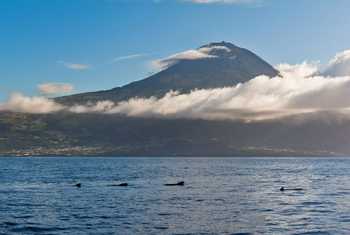Pico is a fascinating island both scenically and geologically. Vews of Fin and Sperm Whales earlier in the week were eclipsed by a dazzling day of Loggerhead Turtles, Common, Bottlenose and sparring Risso's Dolphins with an afternoon gazing in awe at the incredible length of not one, but two Blue Whales. Luck plays a part of course, but Naturetrek and the expertise of the local partners enabled views that would be hard to beat anywhere in the world. Memorable - another tick on anyone's wildlife 'bucket list.' But much more than that - a real insight into a cetaceans world about which we still know comparatively little.
N.J. London



Tour Itinerary and Reports
Can I help you?
Great Whales of the Azores (Pico)
Tour Code: PRT12A 9-day holiday to the island of Pico in the centre of the Azores archipelago, timed to coincide with the arrival of migrating Fin, Sei and Blue Whales, which join resident Sperm Whales and dolphins each spring.
£2,595
£2,095
Highlights
Tour Itinerary and Reports
Can I help you?
Quick Enquiry
Summary
For this whale-watching holiday to the Azores we are offering two separate itineraries. The first, based on São Miguel, involves direct flights from London to Ponta Delgada (on São Miguel), a short transfer to a marina-side hotel and whale-watching excursions focusing on Fin and Sperm Whales, with a chance of seeing a passing Blue Whale and other cetaceans. The second is based on Pico, which is reached by a flight from London via Lisbon (with an overnight stay in the vibrant Portuguese capital) and is more suited to those who are very keen to have a higher chance of seeing Blue Whales, as statistically this iconic species is more frequently recorded in this central part of the Azores than in the east. Both Fin and Sperm Whales, as well as other cetaceans, are also seen regularly off Pico. The Azores archipelago is thought to provide a convenient ‘midway stopover’ for populations of Blue and Fin Whales to refuel during their journey between southern breeding grounds and their summer foraging sites in eastern Greenland and Iceland to the north, and this holiday (both itineraries) is timed to coincide with their migration. Weather permitting, there will also be a day or two to explore the island's history, landscapes and terrestrial wildlife.
PLEASE NOTE: This tour can be combined with our Great Whales of the Azores (Sao Miguel) tour. See PRT11.
- Blue Whales stop over in Azorean waters on migration each spring
- Fin, Humpback, Sei and Bryde's Whales all possible in Late April and May
- Sperm Whales, plus Bottlenose, Risso’s & Short-beaked Common Dolphins seen year-round
- Striped & Atlantic Spotted Dolphins possible in May
- Roseate Tern and island ‘races’ of birds such as Chaffinch & Goldcrest
- Choice of combining with our 8-day tour to São Miguel focusing on more great whales and Azore's Bullfinch
- Led by expert naturalist guides
Far out in the Atlantic Ocean, where the Eurasian and North American tectonic plates meet, the nine islands of the Azores archipelago lie in an arc along the Mid-Atlantic Ridge, rising to just over 2,351 metres at their highest point, Mount Pico. The Azores offers the best whale-watching opportunities in Europe, and each spring the resident Sperm Whales are joined by other great whales, including the largest animal thought to have ever lived, the Blue Whale. The islands are also home to many breeding seabirds such as Cory’s Shearwater, and several endemics including Azores Bullfinch and Azores Chaffinch. All of the islands in the archipelago have volcanic origins. Situated in the eastern Azores, São Miguel is the largest and boasts impressive bubbling calderas and iron-rich thermal pools as well as gardens nestling in secluded valleys and hiking trails with wonderful vistas at every turn. Pico lies in the centre of the archipelago, on the Azores Platform, just to the east of the Mid-Atlantic Ridge, and its surrounding seas are a particularly important stopover for migrating whales heading north to their summer feeding grounds.
Based on Pico, which is reached by a flight from London via Lisbon (with an overnight stay in the vibrant Portuguese capital), this tour is more suited to those who are very keen to have a higher chance of seeing Blue Whales, as statistically this iconic species is more frequently recorded in this central part of the Azores than in the east. Fin, Sei and Sperm Whales as well as other cetaceans are also seen regularly off Pico and neighbouring Faial. Several species of large baleen whale migrate annually north and south through the Atlantic Ocean, their journeys taking them across vast areas where food is seldom abundant. The Azores archipelago is thought to provide a convenient ‘midway stopover’ for populations of Blue, Sei and Fin Whales to refuel during their journey between breeding grounds further south, and their summer feeding sites in eastern Greenland and Iceland to the north. Studies have shown that individuals typically remain around the Azores from between a few days and two months and that the highest number of baleen whale sightings occurs in May. Fin Whales are the most frequently recorded species at this time, although small numbers of Minke, Sei, Bryde's and Blue Whales are also seen each spring. They join the resident Sperm Whales, plus three dolphin species: Bottlenose, Risso’s and Short-beaked Common Dolphin. Striped and Atlantic Spotted Dolphins arrive with the warmer currents during the late spring and early summer.
During our stay in the Azores, we will join expert local marine biologists and guides — on exhilarating RIBs — to search for Fin, Blue and Sei Whales, as well as other species of cetacean, on half-day boat trips (weather permitting). We will scan the ocean for signs of these cetaceans, which are attracted here by the annual spring plankton bloom. Being close to these huge animals is one of life’s most moving and exciting experiences. Whale-watching guidelines are strictly adhered to in the Azores, allowing us to only approach within a comfortable distance for the whale. Feeding animals move quickly, however, and we may find that a whale chooses to swim alongside our vessel; it is an unforgettable thrill to see the vast outline of an animal the length of two school buses end to end just metres away!
There will also be an opportunity to explore some of the different birdwatching sites on the island, and there will be a ‘free day’ during each tour which may be spent at leisure. We are also likely to come across a variety of other species during our stay including Barolo Shearwater, Roseate Tern, Whimbrel, Atlantic Canary and the Azorean race of Common Buzzard.
Please note that our exact itinerary will be kept flexible, taking into account the weather conditions during the course of each holiday. After a week of exciting whale-watching, some gentle birdwatching on land and tasty Azorean cuisine and wine, it will be time to leave our island home and make the short drive back to the airport for our flight to London.
Outline Itinerary

What's Included?
- Flights
- Accommodation: A comfortable hotel near the sea. All rooms have private facilities.
- Food:
Breakfasts are included, lunches and dinners are excluded from the tour price. Allow £45 per day for these.
Reviews
-
-
Our whale watching trip in the Azores exceeded expectations with over 40 cetacean sitings. CW Azores, the local company, are a very professional operation and all the staff were fully committed to giving us the best experiences while fully respecting the animals. The Naturetrek guide Cathy Harlow was second to none.
M.D. London -
I think the small group worked really well on this holiday. I enjoyed most getting close to the sperm whales, blue whales, fin whales and the common dolphins.
G.S. Dorset -
The organisation was amazing, especially when the weather was against us. The friendliness of the local guides and the trip leader. Having never been into wildlife, this was a fun and inspiring trip that's opened my eyes.
B.B. Dorset -
Fantastic sightings of whales of four species plus lots of other animals. Really nice group of people - just the right size too. Very nice, helpful people at the whale watching organisation.
C.B. Hampshire -
Sara's knowledge, enthusiasm, good humour and organisational abilities ensured a very enjoyable trip. Highlights - all cetacean sightings, especially Blue Whale close to the boat.
Mr & Mrs M. Wiltshire -
Very good itinerary but unfortunately the weather was a challenge with wind, rain and rough seas, however we did have excellent sightings and close sightings of blue and fin whales and dolphins.
S.B. West Yorkshire -
I thought the whole trip went smoothly, Naturetrek working with the local whale watching company and getting the job done. Our guide Cathy was always on hand to sort any minor hiccup out, or organise the day events or just talk and discuss things with.
G.R. Lincolnshire -
From start to finish, everything was excellent. Cathy was a pleasure to be with, her knowledge and help invaluable. She worked non stop to make sure everyone had a fantastic holiday. An excellent tour leader. One of the best so far with Naturetrek.
Mr & Mrs A. Derbyshire -
What a trip - many thanks to Ed for such good organisational and leadership skills. No one can organise the weather but luck was with us for a superb whale and dolphin spectacular - the 'blue' icing on the cake - to see not one but two of the largest animals that have ever lived. Wow! The local guides were brilliant too!
J.B. Norfolk
Dates & Prices
2026

Tour Leader: Tim Melling
Tim has had a keen interest in all forms of natural history since childhood. A testament to his precocious knowledge is that he was overall runner-up in the first series of the Radio 4 natural history quiz 'Wild Brain'! From these auspicious beginnings, he went on to complete a degree in zoology, then a PhD in butterfly ecology. The entirety of his career was focused on nature conservation, with 30 years of it spent working as a conservation officer for the RSPB. He took an early retirement from full-time work in 2019.
His main interest is birds, although he has considerable expertise in mammals, butterflies, moths, dragonflies and wild flowers. He's also a skilled and prolific photographer, which is especially evident on his Flickr page! His passion for wildlife and skill at communication make him an eminently popular public speaker at events such as Birdfair, and our annual roadshow across the UK. He has a kind, generous personality, which combined with his encyclopaedic knowledge and broad skillset, make him an ideal tour leader.
Tim's led for us since the late 1990s, which has taken him to exciting destinations such as the Arctic, Antarctic, North and South America, Africa and both tropical and temperate Asia.
Why Naturetrek?
At Naturetrek we craft expertly-guided group and tailor-made wildlife holidays and cruises to all seven continents. On one of our holidays, you can be assured that our passionate team will enable you to experience and enjoy the best of the world's wildlife and natural spectacles in as comfortable and rewarding a manner as possible, caring as best we can for the environment in the process. We are proud to provide:
- The widest choice of wildlife holidays worldwide
- Tours managed and led by naturalists, for naturalists
- Outstanding value and exceptional customer service
Furthermore, as a Naturetrek client, our office team are always to on hand to help you – so if you have any queries about your holiday, whether before or after you have booked, we will be delighted to answer them on the phone. Please just give our team a call!



 Loading search...
Loading search...


















